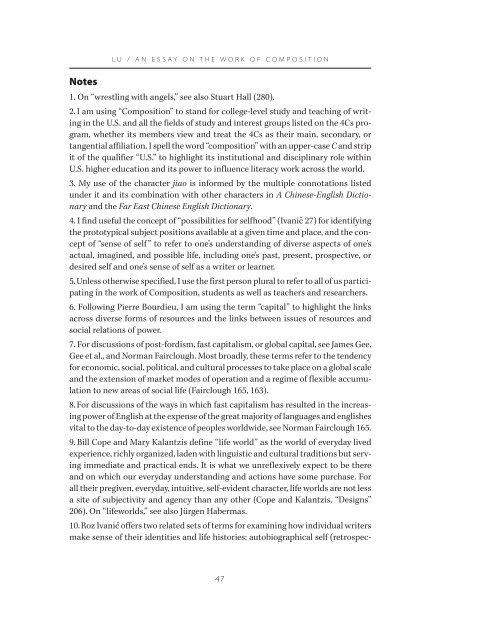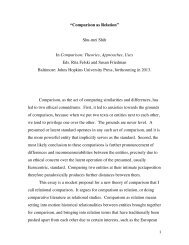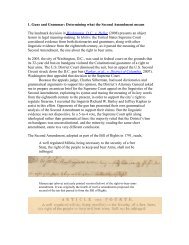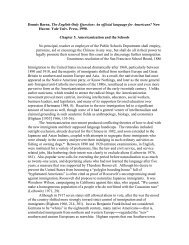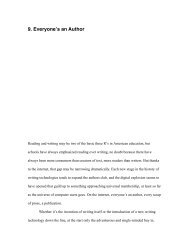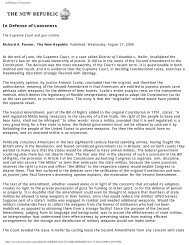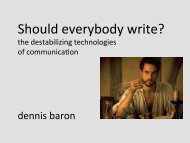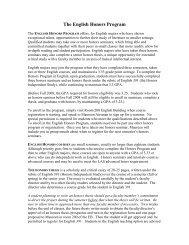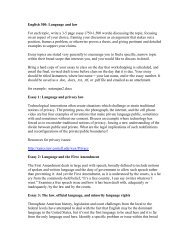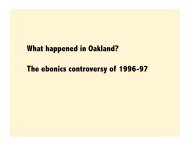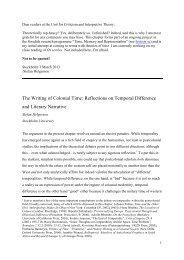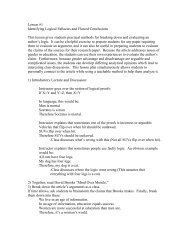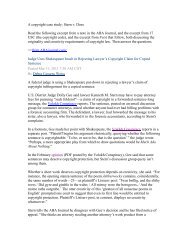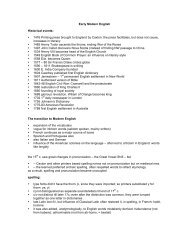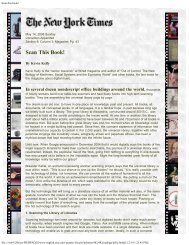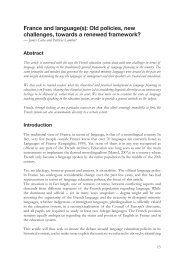An Essay on the Work of Composition: Composing English against ...
An Essay on the Work of Composition: Composing English against ...
An Essay on the Work of Composition: Composing English against ...
Create successful ePaper yourself
Turn your PDF publications into a flip-book with our unique Google optimized e-Paper software.
Notes<br />
LU / AN ESSAY ON THE WORK OF COMPOSITION<br />
1. On “wrestling with angels,” see also Stuart Hall (280).<br />
2. I am using “Compositi<strong>on</strong>” to stand for college-level study and teaching <strong>of</strong> writing<br />
in <strong>the</strong> U.S. and all <strong>the</strong> fields <strong>of</strong> study and interest groups listed <strong>on</strong> <strong>the</strong> 4Cs program,<br />
whe<strong>the</strong>r its members view and treat <strong>the</strong> 4Cs as <strong>the</strong>ir main, sec<strong>on</strong>dary, or<br />
tangential affiliati<strong>on</strong>. I spell <strong>the</strong> word “compositi<strong>on</strong>” with an upper-case C and strip<br />
it <strong>of</strong> <strong>the</strong> qualifier “U.S.” to highlight its instituti<strong>on</strong>al and disciplinary role within<br />
U.S. higher educati<strong>on</strong> and its power to influence literacy work across <strong>the</strong> world.<br />
3. My use <strong>of</strong> <strong>the</strong> character jiao is informed by <strong>the</strong> multiple c<strong>on</strong>notati<strong>on</strong>s listed<br />
under it and its combinati<strong>on</strong> with o<strong>the</strong>r characters in A Chinese-<strong>English</strong> Dicti<strong>on</strong>ary<br />
and <strong>the</strong> Far East Chinese <strong>English</strong> Dicti<strong>on</strong>ary.<br />
4. I find useful <strong>the</strong> c<strong>on</strong>cept <strong>of</strong> “possibilities for selfhood” (Ivanic 27) for identifying<br />
<strong>the</strong> prototypical subject positi<strong>on</strong>s available at a given time and place, and <strong>the</strong> c<strong>on</strong>cept<br />
<strong>of</strong> “sense <strong>of</strong> self” to refer to <strong>on</strong>e’s understanding <strong>of</strong> diverse aspects <strong>of</strong> <strong>on</strong>e’s<br />
actual, imagined, and possible life, including <strong>on</strong>e’s past, present, prospective, or<br />
desired self and <strong>on</strong>e’s sense <strong>of</strong> self as a writer or learner.<br />
5. Unless o<strong>the</strong>rwise specified, I use <strong>the</strong> first pers<strong>on</strong> plural to refer to all <strong>of</strong> us participating<br />
in <strong>the</strong> work <strong>of</strong> Compositi<strong>on</strong>, students as well as teachers and researchers.<br />
6. Following Pierre Bourdieu, I am using <strong>the</strong> term “capital” to highlight <strong>the</strong> links<br />
across diverse forms <strong>of</strong> resources and <strong>the</strong> links between issues <strong>of</strong> resources and<br />
social relati<strong>on</strong>s <strong>of</strong> power.<br />
7. For discussi<strong>on</strong>s <strong>of</strong> post-fordism, fast capitalism, or global capital, see James Gee,<br />
Gee et al., and Norman Fairclough. Most broadly, <strong>the</strong>se terms refer to <strong>the</strong> tendency<br />
for ec<strong>on</strong>omic, social, political, and cultural processes to take place <strong>on</strong> a global scale<br />
and <strong>the</strong> extensi<strong>on</strong> <strong>of</strong> market modes <strong>of</strong> operati<strong>on</strong> and a regime <strong>of</strong> flexible accumulati<strong>on</strong><br />
to new areas <strong>of</strong> social life (Fairclough 165, 163).<br />
8. For discussi<strong>on</strong>s <strong>of</strong> <strong>the</strong> ways in which fast capitalism has resulted in <strong>the</strong> increasing<br />
power <strong>of</strong> <strong>English</strong> at <strong>the</strong> expense <strong>of</strong> <strong>the</strong> great majority <strong>of</strong> languages and englishes<br />
vital to <strong>the</strong> day-to-day existence <strong>of</strong> peoples worldwide, see Norman Fairclough 165.<br />
9. Bill Cope and Mary Kalantzis define “life world” as <strong>the</strong> world <strong>of</strong> everyday lived<br />
experience, richly organized, laden with linguistic and cultural traditi<strong>on</strong>s but serving<br />
immediate and practical ends. It is what we unreflexively expect to be <strong>the</strong>re<br />
and <strong>on</strong> which our everyday understanding and acti<strong>on</strong>s have some purchase. For<br />
all <strong>the</strong>ir pregiven, everyday, intuitive, self-evident character, life worlds are not less<br />
a site <strong>of</strong> subjectivity and agency than any o<strong>the</strong>r (Cope and Kalantzis, “Designs”<br />
206). On “lifeworlds,” see also Jürgen Habermas.<br />
10. Roz Ivanic <strong>of</strong>fers two related sets <strong>of</strong> terms for examining how individual writers<br />
make sense <strong>of</strong> <strong>the</strong>ir identities and life histories: autobiographical self (retrospec-<br />
ˆ<br />
ˆ<br />
47


